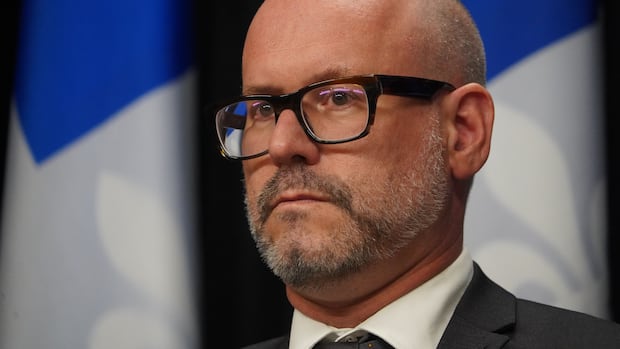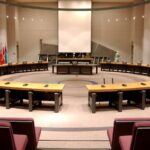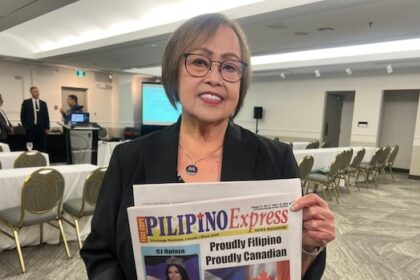MontrealA report looking into the implementation of the Viens commission’s recommendations has found some Indigenous youth in Quebec rehabilitation centres are reprimanded for speaking their mother tongue.Ombudsman Marc André Dowd issued update on implementation of Viens reportFranca G. Mignacca · CBC News · Posted: Nov 06, 2025 2:48 PM EST | Last Updated: 41 minutes agoListen to this articleEstimated 5 minutesThe audio version of this article is generated by text-to-speech, a technology based on artificial intelligence.Quebec ombudsman, Marc André Dowd, recommends extending cultural safety measures to include the education and justice systems. (Sylvain Roy Roussel/CBC)Six years after the Viens report documented the mistreatment of Indigenous people and issued 142 recommendations, an update looking into its implementation has found recent budget restrictions may lead to setbacks in putting in place several calls to action. “It’s clear that with the financial envelopes that we heard that are not going to be continued. … It leaves all these great initiatives in a precarious state,” said Assunta Gallo, deputy ombudsman in charge of users and special mandates.On Thursday, she said the budget restrictions may even lead to certain positions, such as those of interpreters, being nixed.The report published by Quebec ombudsman Marc-André Dowd, found issues with the government’s implementation of its new cultural sensitivity law. He also found language barriers leading to discrimination in public services. According to Dowd, some Indigenous youth in Quebec’s rehabilitation centres continue to be reprimanded for speaking their mother tongue. He cites examples of centres in Sept-Îles, Trois-Rivières and Drummondville, Que., where youth are allegedly instructed not to speak their language with others in the facilities. Quebec’s language law contains exceptions for Indigenous communities, but the ombudsman finds there are inconsistencies in its application. “Yes, the exceptions in the law exist. The challenge is: are we all interpreting it in the same way and are we all applying it in the same way,” said Gallo. Gallo said that once these issues were flagged to the ombudsman’s office, the rehabilitation centres were instructed to allow the youth to speak in their own language. No clear budget for cultural safety, says GalloThe report also points to issues and delays with the government’s implementation of its new cultural safety law in the health-care system. The law was put in place in Dec. 2024, following the death of Joyce Echaquan, at a Joliette hospital a few years prior. The law requires all health-care institutions adopt a cultural safety approach that takes the realities of Indigenous patients into account during treatment. It also puts in place measures to include more Indigenous workers in the health-care network. At the time of the law’s adoption, the government was heavily criticized by groups for its refusal to include the words “systemic racism” in the piece of legislation.The implementation of the law is now under the responsibility of Santé Québec, but the ombudsman has found the province has yet to release a detailed action plan to ensure it is put in place consistently.Gallo said the province also hasn’t made clear its budget for it. The ombudsman says individual health-care facilities have put cultural safety measures in place, but there isn’t a clear strategy across the board. “These initiatives are very fragmented … it depends on the willingness to put it in place, it depends on the energy that’s put into it,” said Gallo. ‘A real societal project,’ says Indigenous Affairs MinisterAmong the ombudsman’s recommendations in this latest report is that the government extend its cultural safety strategy to include other sectors, especially in the justice and education systems. According to the report, efforts have been made to hire more Indigenous workers in justice and public security, but the job postings are often temporary, and the precarity of these positions makes it difficult to find and retain the employees. Finding and retaining Indigenous workers has also been a challenge, the report finds, in health care.”The [ombudsman] report highlights several important advancements, notably in cultural safety,” Indigenous Affairs Minister Ian Lafrenière said in a statement. “But we know there is still work to be done: it is a real societal project.” Lafrenière added that his government has invested more than any previous government to put concrete measures adapted to Indigenous realities in place. The Viens commission recommended that the ombudsman be tasked with evaluating the progress of the calls to action. The ombudsman’s last update until now had been in 2023, when he found less than a third of the recommendations had been implemented or were progressing as expected.In his latest report, the ombudsman only evaluated the implementation of 129 of the 142 calls to action from the Viens commission, looking at them under general themes rather than quantifying them. A second report, focused on the calls to action regarding youth protection, will be released at a later date. ABOUT THE AUTHORFranca G. Mignacca is a journalist at CBC Quebec.
Friday, 6 Feb 2026
Canada – The Illusion
Search
Have an existing account?
Sign In
© 2022 Foxiz News Network. Ruby Design Company. All Rights Reserved.
You May also Like
- More News:
- history
- Standing Bear Network
- John Gonzalez
- ᐊᔭᐦᑊ ayahp — It happened
- Creation
- Beneath the Water
- Olympic gold medal
- Jim Thorpe
- type O blood
- the bringer of life
- Raven
- Wás’agi
- NoiseCat
- 'Sugarcane'
- The rivers still sing
- ᑲᓂᐸᐏᐟ ᒪᐢᑿ
- ᐅᑳᐤ okâw — We remember
- ᐊᓂᓈᐯᐃᐧᐣ aninâpêwin — Truth
- This is what it means to be human.
- Nokoma











